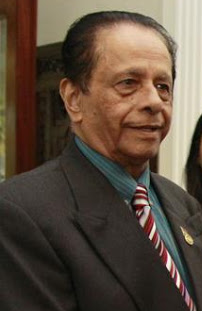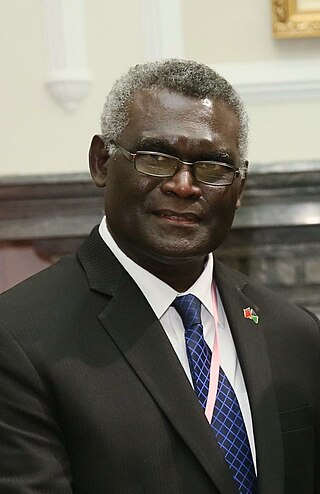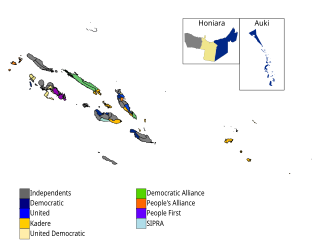People's Alliance Party | |
|---|---|
| Founded | 1979 |
| Preceded by | Rural Alliance Party People's Progressive Party |
| National Parliament | 0 / 50 |
 |
|---|
The People's Alliance Party (PAP) is a political party in Solomon Islands.
People's Alliance Party | |
|---|---|
| Founded | 1979 |
| Preceded by | Rural Alliance Party People's Progressive Party |
| National Parliament | 0 / 50 |
 |
|---|
The People's Alliance Party (PAP) is a political party in Solomon Islands.
The PAP was formed in 1979 through a merger of the Rural Alliance Party and the People's Progressive Party. [1] Led by Solomon Mamaloni, it won ten of the 38 seats in the 1980 general elections and Mamaloni became Leader of the Opposition. [1] When the Solomon Islands United Party (SIUP) government fell in 1981, Mamaloni was able to form a coalition government with the National Democratic Party and independent MPs and became Prime Minister. [1] The party received the most votes in the 1984 elections, winning 12 seats. However, the SIUP won 14 and the PAP returned to opposition.
The PAP won a landslide victory in the 1989 elections, taking 23 of the 38 seats and Mamaloni became Prime Minister again. The 1993 elections saw the party reduced to nine seats as the Solomon Islands Government of National Unity, Reconciliation and Progress Party (SIGNUR) won 20. However, SIGNUR leader Francis Billy Hilly lost a vote of no-confidence in 1994 and Mamaloni was elected Prime Minister in his place. The PAP won only seven seats in the 1997 elections, resulting in Mamaloni returning to being Leader of the Opposition, a post he held until his death in 2000.
The party won 20 of the 50 seats in the 2001 elections, becoming the largest party in Parliament. The PAP's Allan Kemakeza became Prime Minister. In the 2006 elections, the party was reduced to three seats in a Parliament dominated by independents. It won two seats in the 2010 elections, [2] and three in the 2014 elections.
| Election | Votes | % | Seats | +/– |
|---|---|---|---|---|
| 1980 | 9,085 | 15.76 (#2) | 10 / 38 | New |
| 1984 | 15,923 | 23.26 (#1) | 12 / 38 | |
| 1989 | 15,562 | 19.23 (#1) | 23 / 38 | |
| 1993 | 20,267 | 16.40 (#2) | 9 / 47 | |
| 1997 | 7 / 50 | |||
| 2001 | 20 / 50 | |||
| 2006 | 11,935 | 6.26 (#3) | 3 / 50 | |
| 2010 | 4,619 | 1.96 (#5) | 0 / 50 | |
| 2014 | 11,414 | 4.44 (#5) | 3 / 50 | |
| 2019 | 18,573 | 6.00 (#6) | 2 / 50 | |
| 2024 | 5,593 | 1.62 (#9) | 0 / 50 |

Singapore is a parliamentary representative democratic republic whereby the president of Singapore is the head of state, the prime minister of Singapore is the head of government, and of a multi-party system. Executive power is exercised by the Cabinet from the parliament, and to a lesser extent, the president. Cabinet has the general direction and control of the government and is accountable to Parliament. There are three separate branches of government: the legislature, executive and judiciary abiding by the Westminster system. Singapore has been described as being a de facto one-party state.

Politics of Solomon Islands takes place within the framework of a parliamentary representative democratic, constitutional monarchy. Solomon Islands is an independent Commonwealth realm, where executive power is exercised by the government. Legislative power is vested in both the government and a multi-party parliament.

Sir Anerood Jugnauth, GCSK, PV, was a Mauritian statesman, politician and barrister who served both as President and Prime Minister of Mauritius. He was Member of Parliament for Piton & Riviere Du Rempart. A central figure of Mauritian politics in the 1980s and 1990s, he was Leader of the Opposition from 1976 to 1982. He served four consecutive terms as prime minister from 1982 to 1995 and again from 2000 to 2003. He was then elected as President from 2003 to 2012. Following his party's victory in the 2014 general elections, he served his sixth and final term as prime minister, becoming the nation's longest serving prime minister with more than 18 years of tenure, overtaking Seewoosagur Ramgoolam, who held the office for 14 years.
A hung parliament is a term used in legislatures primarily under the Westminster system to describe a situation in which no single political party or pre-existing coalition has an absolute majority of legislators in a parliament or other legislature. This situation is also known as a balanced parliament, or as a legislature under no overall control (NOC), and can result in a minority government.

Since 1967, Mauritius has experienced 12 free and fair democratic general elections to choose a government.

Chiam See Tong is a Singaporean retired politician and lawyer who served as the Secretary-General of Singapore Democratic Party (SDP) between 1980 and 1993 and Secretary-General of Singapore People's Party (SPP) between 2011 and 2019 and the chairman of Singapore Democratic Alliance (SDA) between 2001 and 2011. He was the de facto Leader of the Opposition when he became the Member of Parliament (MP) for Potong Pasir Single Member Constituency (SMC) and served between 1984 and 2011.
Solomon Sunaone Mamaloni was a Solomon Islands politician. He was the first chief minister of the islands, and later served as the prime minister for three spells in the 1980s and 1990s.

General elections were held in Singapore on 21 September 1963, five days after Singapore became part of Malaysia. Voters elected all 51 members of the Legislative Assembly. The elections were the only ones to date with no boundary changes to any existing constituencies prior to the elections. The result was a victory for the People's Action Party (PAP), which won 37 of the 51 seats, while the majority of the remaining seats were won by Barisan Sosialis (BS).

The Solomon Islands Liberal Party (SILP) was a political party in the Solomon Islands.

Manasseh Damukana Sogavare is a Solomon Islander politician who served as the prime minister of Solomon Islands from 24 April 2019 until his successor, Jeremiah Manele took office in May of 2024. He previously held the office in 2000–2001, 2006–2007, and 2014–2017; in all, he has served over nine years as prime minister. Before becoming prime minister, Sogavare served in the National Parliament representing East Choiseul since 1997.

Bartholomew (Bart) Ulufa'alu CMG was the prime minister of Solomon Islands from 27 August 1997 to 30 June 2000.
The Solomon Islands Social Credit Party ("Socreds") was a political party in the Solomon Islands that espoused social credit theories of monetary reform. It opposed foreign interference in the economy of the country.

General elections were held in Singapore on 7 May 2011. President S. R. Nathan dissolved parliament on 19 April 2011 on the advice of Prime Minister Lee Hsien Loong. Voting is mandatory in Singapore and is based on the first-past-the-post system. Elections are conducted by the Elections Department, which is under the jurisdiction of the Prime Minister's Office. Nomination day was held on 27 April 2011, and for the second election in a row, the PAP did not return to government on nomination day, but it did return to government on polling day. This election also marked the first and the only three-cornered fight since 2001 in Punggol East SMC before it increased to four-cornered fight on a by-election held two years later.

The Solomon Islands United Party (UP) is a political party in Solomon Islands.

General elections were held in the Solomon Islands on 6 August 1980. They were the first since independence has been achieved two years earlier. The Solomon Islands United Party led by Prime Minister Peter Kenilorea emerged as the largest party, winning 16 of the 38 seats. Following the elections, Kenilorea was re-elected Prime Minister.

General elections were held in the Solomon Islands on 24 October 1984. A total of 230 candidates contested the elections, the result of which was a victory for the Solomon Islands United Party, which won 13 of the 38 seats, despite receiving fewer votes than the People's Alliance Party.

General elections were held in the Solomon Islands between 22 May and 12 June 1973. The following year, Solomon Mamaloni of the People's Progressive Party became the first Chief Minister.

The Independent Group (IG) is a political faction in the Solomon Islands comprising the independent members of the Solomon Islands Parliament.

General elections were held in Solomon Islands on 3 April 2019 to determine the composition of the 11th Parliament. The election was the first to occur since the conclusion of the Regional Assistance Mission to the Solomon Islands (RAMSI) in 2017. Parliament passed amendments to the electoral act in 2018 that included the introduction of pre-polling, a significant increase in campaign budgets for candidates and stricter penalties for individuals committing electoral offences such as vote-buying. Ten of the thirteen parties that contested the election won seats, and the Solomon Islands Democratic Party and the Kadere Party were the parties that secured the highest amount, winning eight each. However, as in previous elections, independent candidates won the largest share of seats, securing 21.